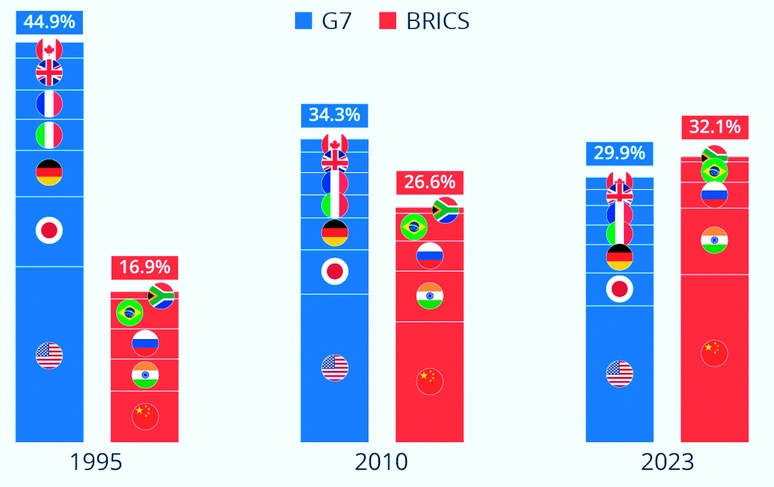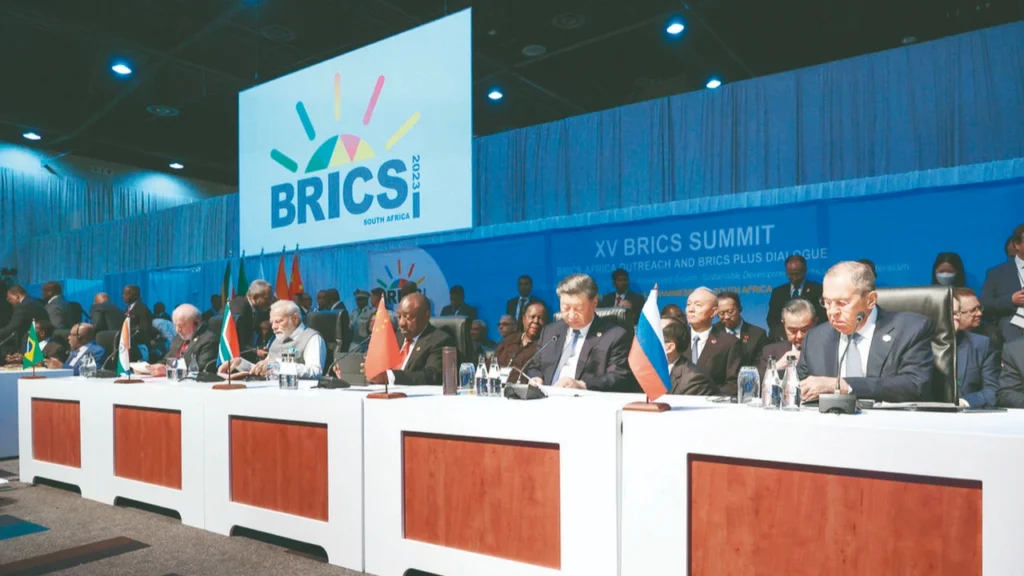Founded in 2009 and initially focusing on finance, development, and trade cooperation, BRICS is evolving into a structure that will yield significant geopolitical and geostrategic outcomes in favor of the oppressed peoples of the world, with the inclusion of new members at its latest summit held in South Africa during the third week of August.
More striking than the accession of six new countries from three continents was the application for membership by over 40 countries. This reaffirms that the “international order” inherited from the 20th century, defined by imperialist hegemony, is failing and that developing world countries need a new order.
THE DEAD END OF WESTERN HEGEMONY
Imperialist plunderers have secured their development at the expense of the rest of the world’s stagnation. The rise of Asian countries, led by China, continued steadily into the 21st century, following its onset in the last quarter of the 20th century, accompanied by independence movements in Africa and Latin America, albeit with some interruptions. From the second half of the last century to today, we’ve seen proclamations of a “flat world” and “the end of history,” and attempts to explain the new status quo as a “commonality of development” between the Global South and North. Now, almost all have shelved these liberal mantras, quickly realizing that the irreconcilable contradictions between exploiters and the exploited continue and that the majority of the world is against them.
Gathering in Johannesburg from August 22 to 24, BRICS convened for all oppressed peoples with the goal of shaping the post-US-centered liberal order world. The decision to officially include Argentina, Egypt, Iran, Saudi Arabia, the United Arab Emirates (UAE), and Ethiopia as BRICS members from the beginning of next year sent a strong message to Washington. This marks a period where the interests of developing world countries will be better represented on the global stage, and the fight against imperialism will be further strengthened.

THE MOTTO FOR DEVELOPMENT: SOLIDARITY AND COOPERATION
China, a key component of BRICS, is pleased with the new additions. Chinese President Xi Jinping described the expansion of BRICS as “of historical significance,” marking “the beginning of a new era for BRICS.” His speech, read by the Chinese Commerce Minister, emphasized “solidarity and cooperation for mutual development,” and he found the Summit’s third occurrence in Africa meaningful, indirectly referencing the last wave of independence against US and French colonialism in Africa. The inclusion of Ethiopia, one of Africa’s fastest-growing economies and host to the headquarters of the African Union, is particularly noteworthy.
One of the most important parts of Xi’s speech was his reminder of the “structure of development not monopolized by a few countries.” Immediately following this statement, Xi addressed the West with “Those presenting their own rules as international norms,” declaring it “unacceptable.”
Xi’s call for practical cooperation in areas where China leads the developing world, such as the digital economy, green development, and supply chains, is another promising development for the oppressed world.
LAYING THE FINANCIAL FOUNDATIONS FOR A MULTIPOLAR ORDER
An unofficial agenda item of the Summit was “de-dollarization.” Although some Western experts claimed this to be “unsustainable,” the process of moving away from the dollar had already begun. Although the BRICS South Africa Summit did not officially include a “reserve currency” on its agenda, there was a demonstrated will to increase trade with local currencies.
In 2015, BRICS established the New Development Bank as a counter to US-dominated financial institutions like the World Bank and IMF. The bank already provides loans in Chinese renminbi and announced post-Summit the addition of South African and Brazilian national currencies. Furthermore, the bank aims to issue its first Indian rupee bond by October (noting that India recently signed a trade agreement with the United Arab Emirates to trade in national currencies instead of the US dollar).
A LIFELINE FOR TURKEY AND THE DEVELOPING WORLD
In an era where international developments almost resemble entropy, BRICS stands on the verge of a new era in the 21st century with 6 new developing countries. Moreover, most of the new countries are from West Asia and are energy giants. This positions BRICS advantageously in managing geopolitical shifts in terms of pricing energy products and countries’ responsibilities and vulnerabilities regarding oil costs. The queue of over 40 countries for membership shows the developing world’s dissatisfaction with the liberal world order and a closer alignment with practical alternatives.
Turkey and developing countries, facing increasing foreign currency shortages amid significant geopolitical transformations like the pandemic and the Ukraine issue over the last 5 years, have been disconnected from their national productions within the international imperialist division of labor based on neoliberalism for about the last 50 years, leading to the continuous devaluation of their national currencies. These countries, seeking alternatives to the Paris Club, will increasingly need the credits provided by the New Development Bank. More importantly, there’s a need for a new order that doesn’t rely on plundering other countries but is based on mutual, equal, fair, human-centered cooperation and non-interference in each other’s internal affairs. This is what BRICS offers to the world.

BRICS OUTPACES THE G7
Russian President Putin, in his video message to the Summit, particularly emphasized the problem of “accumulating public and private debts,” suggesting that BRICS could offer new solutions. Putin also highlighted “unilateral and international law-violating sanctions,” using empirical data to refresh confidence in the economic superiority of the five founding BRICS countries over the US-centered G7 (see Table 1 for detailed facts highlighted by Putin). Russia will assume the BRICS presidency next year, and the first expanded BRICS+ Summit, expected to be held in Kazan in October 2024, is thought to be themed “Strengthening Multilateralism for Justice in Global Development and Security.”





